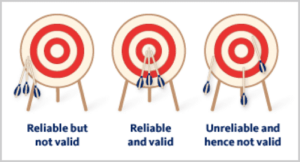You know it’s important to use a validated pre-employment assessment (versus an assessment that’s not validated). But what does ‘valid’ mean, exactly? And is it possible for an assessment to be valid but not reliable? Or reliable but not valid?
If you’re in the process of vetting assessment vendors, then these questions are critical. But as an HR or Talent Acquisition leader, the answers probably aren’t so obvious. An assessment may look sleek on the surface, but how do you know that it’s supported by actual science?
Here’s how I/O psychologists and research scientists evaluate pre-employment assessments:
Is it valid?
Validity tells you how well the test is measuring what it’s supposed to be measuring. In a pre-employment assessment, these measurements, or scales, might be behavioral traits such as sociability or accommodation.
Validity also tells you whether those traits are accurate predictors of job success. We know from research with more than 1.5 million job candidates that sociability and accommodation do in fact predict success in customer service environments, and in management and leadership positions. But in other jobs, these traits are less important.
So, for a pre-employment assessment to be valid, it must meet two conditions:
- Ask questions that are relevant to the job (face validity).
- Prove a correlation between assessment scores and job performance (criterion validity).
Is it reliable?
Reliability is about consistency, or the extent to which the test produces similar results under similar conditions. If someone scores high on sociability, for example, he or she should get the same result if the test is taken again six weeks later. If the same test-taker gets a different score, then you should question the assessment’s reliability.
So while validity tells you how good a test is for a particular situation, reliability tells you how trustworthy the score or the measurement is. Think of it this way:
If you measure the length of your dining room table at 72 inches, it should be 72 inches the next time you measure it. If it’s not, then your tape measure (or the way you’re using it) is unreliable. If you measure your table and it’s 72 inches every time, but you find out your table is actually 68 inches, then your tape measure is reliable but invalid.

Here’s the bottom line: If you’re going to invest in a pre-employment assessment, it must be both valid and reliable, otherwise it’s not going to add any value to your talent selection process.
To learn more about why validation matters and how to increase validity of predicting day-one performance, download our free whitepaper comparing different talent evaluation methods.


